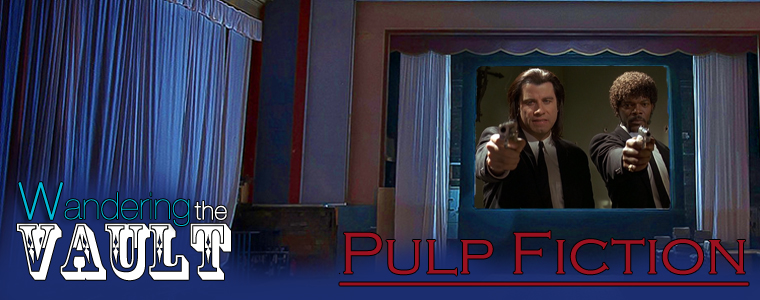Pulp /’pəlp/ n. 1. A soft, moist, shapeless mass of matter
by Andrew Collins
After seeing Reservoir Dogs last week and having now attended the one-night theatrical return of Pulp Fiction in honor of 20 years of Quentin Tarantino filmmaking, I see why Tarantino is such a big deal.
In Pulp Fiction we find him using the same narrative technique as in Reservoir Dogs, where each scene bounces back and forth in time, eventually filling in a patchwork story. In seven clearly demarcated parts, Pulp Fiction tells the story of two hit men, their boss, their boss’s wife, and a boxer that the boss tried to pay off to rig a fight. Any summary beyond that would be futile. The film doesn’t end on the scene that comes last chronologically, and when it’s all over, one still has trouble piecing it all together into a central plot and figuring out the main point — if there even is one.
Couple this with the fact that Pulp Fiction makes no attempt to tug at the audience’s heartstrings. It’s hardly emotionally engaging at all, and I found that I didn’t care deeply about any of the characters. Normally if that’s the case in a film, you have a problem.
Therein lies the tension. From a conventional filmmaking perspective, this movie shouldn’t work. It has no heroes, no clear-cut protagonist, and no dominant storyline. “Pulp Fiction” is an apt title for a film composed of a mishmash of characters from old dime novels, neo-noir, and black comedy.
In the hands of a talented young director like Tarantino, however, these elements become a study on how to craft awfully good scenes. Pulp Fiction runs on the raw energy of character in the moment. Tarantino’s maxim about character comes through here just as in Reservoir Dogs:
“When it comes to the actual writing of the piece, it’s about character. I don’t lead the characters, I let the characters lead me.”
This is an interesting screenwriting philosophy because it seems to preclude any chance of a nice, tight storyline — typically a desirable thing in a film. Every detail in a traditionally good story has significance because it develops characters or forwards the plot in some way. Pulp Fiction has the paradoxical condition of being full of details and happenings that don’t contribute to the film as a whole yet still feel like they were intentionally put there.
Why, for example, do Vincent (John Travolta) and Mia (Uma Thurman) talk about the five-dollar milkshake that she orders? Why is Jules’s (Samuel Jackson) first target eating a Big Kahuna Burger? And what does Jules having a vegetarian girlfriend have to do with anything? Who knows? But who cares? Pulp Fiction treats the audience to episodes in the lives of a diverse cast of characters and personality types as they try to deal with the crazy twists that life throws their way. When Vincent accidentally shoots the brains out of his accomplice while driving with Jules, it becomes a hilarious character study as the two suddenly find themselves in a blood-splattered car with a body to dispose of. In all of these moments, there’s a sort of postmodern authenticity that keeps us utterly engaged. Forget overarching narrative or destiny; what you see in a scene is what you get. Each part resolves itself enough to allow the film to comfortably move on to the next scene.
The same goes for the dialogue. Pulp Fiction features some of the most brilliantly scripted scenes I’ve ever seen. The timing, the tone, the stutters, the self-admittedly awkward pauses — all are flawlessly calculated. While watching, I often thought in the back of my mind, “Man, these lines are brilliant,” but they are so perfectly imperfect that they never distract from the magic of being in the scene in the moment. The iconic conclusion of the second part of the film (NSFW language) is a prime example. Jules grows in intensity, the camera focuses close on his face as his eyes widen. “Oh I’m sorry, did I break your concentration?” He quotes an improvised Bible verse to his target and then shoots him. The whole spiel is an act he puts on as a hit man, but when we see Jules later in the film at a coffee shop contemplating his deeds, he remains the same testy black man, and one gets the sense that, aside from the Bible verse, he makes it all up as he goes along. The more I think back on those scenes, the funnier they seem.
I’m still not quite sure what to make of Pulp Fiction, in which the most impressive artistic accomplishment may be avoiding depth and significance without being boring or cliché. That said, it passes my most important criteria for determining whether a movie was good: I can’t wait to watch it again.








